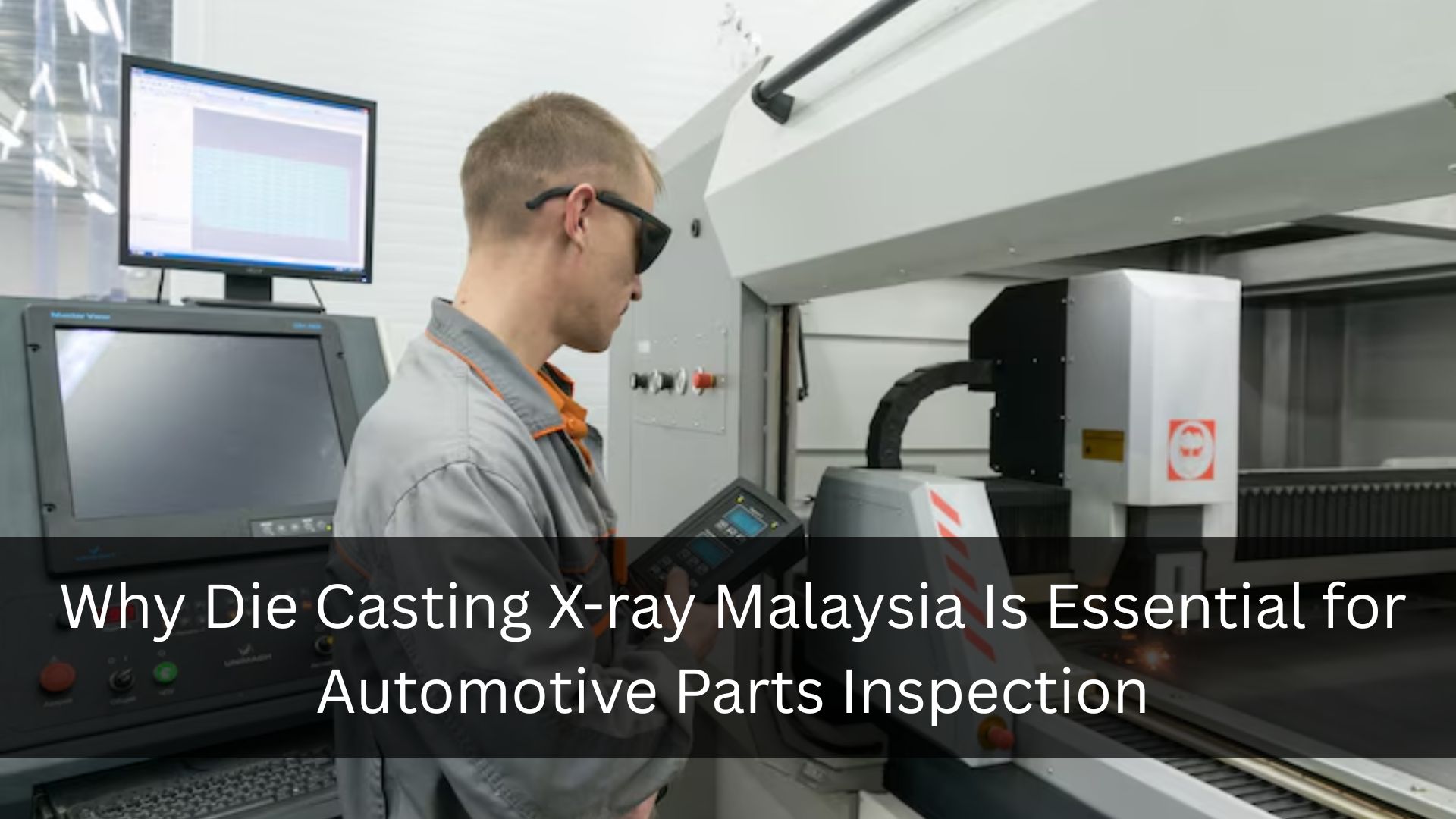The Role of Die Casting in Automotive Manufacturing
Die casting is a widely used method in the automotive industry due to its ability to produce high-strength, complex metal components with excellent surface finishes. It’s ideal for manufacturing lightweight and durable parts like engine blocks, transmission cases, cylinder heads, and brake components.
However, the die casting process—while efficient—is susceptible to internal flaws such as:
- Gas porosity
- Shrinkage cavities
- Cold shuts
- Inclusions
- Cracks and voids
These flaws may not be visible on the surface but can seriously compromise the performance and safety of a part. That’s why die casting X-ray Malaysia systems have become an integral part of automotive quality control, offering a reliable, non-invasive way to detect internal defects.
Why Die Casting X-ray Malaysia Is Indispensable in Automotive QC
Ensuring Structural Integrity with Die Casting X-ray Malaysia
Automotive parts are subjected to high levels of stress and must withstand harsh operating conditions. A cracked engine housing or porous brake component could result in mechanical failure, endangering lives and damaging the manufacturer’s reputation.
Die casting X-ray Malaysia enables manufacturers to view the interior of die-cast parts in real time, revealing flaws before the parts are assembled into vehicles. This proactive approach ensures only structurally sound components proceed to the next stages of production.
Die Casting X-ray Malaysia Prevents Costly Recalls
Vehicle recalls due to component failure can be devastating in terms of cost, logistics, and brand damage. X-ray inspection systems serve as a preventive measure by:
- Identifying flawed components early
- Reducing rework and scrap rates
- Ensuring compliance with ISO and IATF standards
- Enhancing traceability and accountability
By implementing robust die casting X-ray Malaysia protocols, automotive companies can prevent the ripple effects of defective parts reaching the market.
Technological Advancements in Die Casting X-ray Malaysia for Automotive Use
Digital Radiography for High-Speed Automotive Inspection
The latest die casting X-ray Malaysia solutions now employ digital radiography (DR), which replaces traditional film with flat-panel detectors. This allows:
- Instant image capture
- Real-time defect identification
- High-resolution analysis
- Minimal production interruption
Digital X-rays are particularly valuable in high-volume automotive manufacturing, where speed and accuracy must go hand in hand.
3D Computed Tomography (CT) in Die Casting X-ray Malaysia
3D CT scanning has taken defect detection to the next level. It creates detailed 3D images of components, allowing engineers to examine:
- Internal porosity levels
- Wall thickness
- Void locations and volumes
- Assembly misalignments
With die casting X-ray Malaysia systems utilizing CT, automotive companies can conduct dimensional analysis and failure prediction with remarkable precision, improving both product safety and development cycles.
Automation and AI in Die Casting X-ray Malaysia
Automated die casting X-ray Malaysia systems, often coupled with robotic part handling and artificial intelligence (AI), enable manufacturers to:
- Maintain consistent inspection standards
- Reduce human error
- Automatically detect, classify, and reject defective parts
- Continuously improve inspection accuracy through machine learning
AI-enhanced systems can process thousands of X-ray images per day with minimal manual input, offering exceptional scalability for Malaysia’s growing automotive export sector.
Benefits of Die Casting X-ray Malaysia for Automotive Manufacturers
Enhanced Reliability and Safety
The most important benefit of using die casting X-ray Malaysia in automotive inspections is enhanced reliability. Components inspected using X-ray are far less likely to fail, resulting in safer, more dependable vehicles.
Regulatory Compliance and Certification
Automotive components must comply with numerous safety and quality standards. X-ray inspection helps ensure parts meet:
- ISO 9001
- IATF 16949
- OEM-specific quality requirements
This positions Malaysian suppliers as reliable global partners in the automotive supply chain.
Faster Production with Fewer Bottlenecks
Real-time X-ray imaging and automated detection allow for quicker decision-making and reduced bottlenecks on the production floor. This enables:
- Shorter time-to-market
- Lower operational costs
- Higher throughput without sacrificing quality
Sustainability and Reduced Waste
Die casting X-ray systems help reduce scrap by identifying defects early. This leads to less material waste and better resource efficiency—a key consideration for manufacturers aiming to meet environmental goals and sustainable practices.
Die Casting X-ray Malaysia in Action: Use Cases in the Automotive Industry
Case 1: Engine Block Inspection
Engine blocks, often made from aluminum alloys through die casting, must be free of internal defects to handle thermal and mechanical stress. Die casting X-ray Malaysia is used to ensure internal porosity and inclusions are within acceptable limits, thereby preventing overheating and mechanical failure.
Case 2: Transmission Casing Verification
Transmission casings must have exact wall thickness and no voids or shrinkage defects. 3D CT scans via X-ray allow Malaysian manufacturers to verify these tolerances with unmatched accuracy, meeting the precision requirements of both domestic and international automakers.
Case 3: Brake System Components
Brake calipers and housings require robust inspection, as any flaw can compromise braking power. X-ray inspection ensures these safety-critical parts are flawless, supporting both functionality and passenger safety.
Choosing a Die Casting X-ray Malaysia Provider for Automotive Inspection
When selecting an X-ray system for automotive component inspection in Malaysia, manufacturers should look for:
- Systems with both 2D and 3D scanning capabilities
- Compatibility with high-throughput production
- AI integration and automation features
- Local service and technical support
- Certifications for international compliance
Trusted die casting X-ray Malaysia providers will also offer training and maintenance plans to ensure optimal performance.
The Future of Die Casting X-ray Malaysia in Automotive Manufacturing
The demand for electric vehicles (EVs) and lightweight cars is pushing manufacturers toward more intricate die-cast parts. As complexity increases, the need for advanced X-ray inspection will grow. In the future, expect to see:
- Smarter AI-based defect prediction
- Integration with IoT systems for live monitoring
- More compact and energy-efficient X-ray machines
- Use of augmented reality (AR) in inspection training
Malaysian automotive suppliers embracing these technologies will be better positioned to compete globally.
Conclusion: Securing Automotive Excellence with Die Casting X-ray Malaysia
The automotive sector relies heavily on component integrity, and die casting X-ray Malaysia has become a cornerstone technology in ensuring that. From detecting hidden flaws to maintaining global compliance standards, X-ray inspection empowers manufacturers to deliver safe, high-quality vehicles.
As automotive engineering evolves, so too must the inspection methods that safeguard it. Die casting X-ray systems, enhanced by AI, automation, and 3D CT, offer Malaysian manufacturers a strategic edge—boosting reliability, reducing recalls, and enabling long-term growth in a highly competitive global industry.








